Deb Abraham Spalding
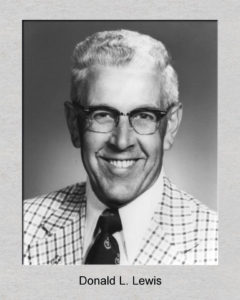 Donald L. Lewis often said his goal was to live to be one hundred years old. Never one to fuss, I’ll assume that he didn’t mind that Heaven called him home slightly early, at the age of ninety-nine and almost two months, because more than likely he was reunited with his beloved wife of sixty-eight years, Freda, there.
Donald L. Lewis often said his goal was to live to be one hundred years old. Never one to fuss, I’ll assume that he didn’t mind that Heaven called him home slightly early, at the age of ninety-nine and almost two months, because more than likely he was reunited with his beloved wife of sixty-eight years, Freda, there.
I knew Donald Lewis all of my life. He and my father were buddies in outdoor pursuits like fishing, hunting, and shooting. My father, Robert Abraham, Sr. and Donald volunteered with the Brotherhood of the Jungle Cock fishing organization for many years by serving as president and on the executive board. Dad shared, “Donald was a true conservationist. He never killed a fish or an animal that he didn’t eat. He would transport live fish in a milk can from the Potomac River to his pond in Thurmont so local kids could fish them out.”
Donald carried my senior high graduation photo in his wallet. Whenever I ran into him, he’d pull out that picture and show everyone nearby. Proud as anything, he’d grin and say, “Look at this beautiful girl in this picture. Do you know her?”
Through my family’s friendship with him, I knew him one way, but while interviewing him for an article in The Catoctin Banner in August 2008, I learned about his impact on people and progress. I was still a green reporter, having taken over the newspaper about a year prior. Donald was selected as one of our “Who Am I?” personalities. For the “Who Am I?” column, readers would call in guesses about who the upcoming spotlight was from clues printed in the previous issue. Donald had the highest number of guesses ever logged in the five years the column was run. Here’s an excerpt from that column:
“Who Am I?” August, 2008
I am Donald Lee Lewis.
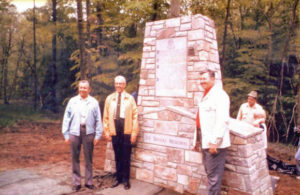 From mayor of Thurmont to Commissioner of Frederick County; from store owner to mortician (yes, you read that right—mortician!); from a decorated Army Ranger to humble husband; and from sportsman to farmer, Donald Lewis is a man you might pass on the street and wonder what he’s seen. You may have met Mr. Lewis when you shopped in his sporting goods and gift store on the square in Thurmont, or you may have waved when you drove by his house on West Main Street (Route 77 west) in Thurmont. You probably still wave, like I do. …having discovered during our interview that he waves at everybody. That’s the person he is: community member, all-around good person. Humble, I say, because he is that, too. For the interview, I sat beside him in the second of triplet rocking chairs in his living room. As we rocked through his stories, I tried to envision what he has lived.
From mayor of Thurmont to Commissioner of Frederick County; from store owner to mortician (yes, you read that right—mortician!); from a decorated Army Ranger to humble husband; and from sportsman to farmer, Donald Lewis is a man you might pass on the street and wonder what he’s seen. You may have met Mr. Lewis when you shopped in his sporting goods and gift store on the square in Thurmont, or you may have waved when you drove by his house on West Main Street (Route 77 west) in Thurmont. You probably still wave, like I do. …having discovered during our interview that he waves at everybody. That’s the person he is: community member, all-around good person. Humble, I say, because he is that, too. For the interview, I sat beside him in the second of triplet rocking chairs in his living room. As we rocked through his stories, I tried to envision what he has lived.
Mr. Lewis was one of twelve children of Edgar Russell and Glenna (Weller) Lewis. After age eight, he was raised by his maternal grandparents who let him stay at their house for several years after he got caught there during a snow storm. “They [his grandparents] just called my mother and asked if they could raise me,” he said.
He did what had to be done in various situations including working his family’s farm in Thurmont. “Those were the days when you milked the cows and fed the horses before you had your breakfast,” he said, “The farm came first.”
After his grandparents passed, he helped his paternal grandfather, J. Hooker Lewis, with his horses. Upon graduating from Thurmont High School in 1935, he worked with the Civilian Conservation Corps where he was sent to Medimountain in Grantsville, Maryland. He met his future wife, Freda Broadwater, there. Humorously, he recalled her falling off a hay wagon while she was throwing hay. They were married in 1942 and spent 62 years together until her death in April of 2004. Mr. Lewis spoke fondly of her and of her last days and admitted, “She was one of the best. We did everything together.”
He joined the Army in 1940 and served in France where he was unharmed by a bullet that zinged around the rim of his helmet. He was posted about thirty feet up in a tree when the bullet entered the front of his helmet at such an angle that it rode the inside rim around his head and exited out the back, making another hole. He bounced down the tree from limb to limb, but came out okay. As luck would have it, soon after, he was hit on the upper left thigh by shrapnel when a tank exploded nearby.
He had four surgeries to remove the shrapnel, the last of which he opted to stay awake without pain medication, so that he could tell the doctor when he found the shrapnel. The doctor removed it.
Upon return, he and Freda worked her family’s farm for a while, and then he became a funeral director and embalmer for Winterberg Funeral Home in Grantsville. A few years later, when Mr. Winterberg died and his family sold the funeral home, Mr. Lewis and his wife bought her family’s farm and farmed it until 1952. It was that year that Mr. Lewis returned to Thurmont. He and Mrs. Lewis purchased Wisotzkey General Store on the corner square in Thurmont. It had a fountain, a toy room on the second floor, and a gift shop. Soon after, he bought the drug store next door and made it into a sporting goods store. They called the business Lewis’ Toys, Gifts and Confectionary. “It was a very good business,” he said.
He was encouraged to run for mayor of Thurmont where he was elected and served three terms from 1964 to 1970. Next, he was encouraged to run for Frederick County Commissioner and was elected and served from 1970 to 1978. In 1986, he and Freda decided to sell the business.
The words printed here don’t pay justice to the man or his experiences. But you, like me, have captured a glimpse of his life, that he has lived well.
James Rada, Jr., contributing editor of The Catoctin Banner newspaper wrote a cover article in honor of Veterans Day in the November 2014 issue. This issue was extremely popular, received many positive comments and is one of my all-time favorites:
Remembering Our Nation’s Veterans
Donald Lewis stood crammed among a group of friends and fellow soldiers, trying not to lose his balance. The landing craft they were on was pushing toward its destination on Omaha Beach at Normandy, France. A strong current threatened to pull them away from their destination.
Lewis was a long way from his hometown of Thurmont, but he, along with millions of other young men, had been drafted to serve in the armed forces during World War II. Though he had entered the army as a private, he had risen to the rank of staff sergeant.
Lewis stood at the front of the landing craft hanging onto the edge of the wall. Around him, he could hear the explosion of artillery and see the explosions on the water and beach. Things seemed a mass of confusion, but it was all part of the largest seaborne invasion ever undertaken: the coordinated D-Day attack on German forces at Normandy, France. The invasion involved 156,000 Allied troops. Amphibious landings along fifty miles of the Normandy Coast were supported by naval and air assaults.
Lewis’ job in the invasion seemed simple. He was to go ashore first and mark safe paths across the irrigation ditches that crossed the beach.
However, the landing craft couldn’t make it to the beach. It grounded on a sandbar.
Lewis and the other men were still expected to take the beach, though. The front ramp of the landing craft was lowered and Lewis ran into the water. He suddenly found himself in water over his head, weighed down by a heavy backpack.
“I just had to hold my breath and walk part of the way underwater until my head was above water,” Lewis said.
The Germans started firing on the beach and the landing craft. Lewis focused on his job and began marking the paths where troops could cross.
“When I looked back, men were laying everywhere,” Lewis said. “Just about everyone on the boat was dead.”
After the war, when he was invited back to Normandy for the anniversary of the D-Day invasion, Lewis always turned down the invitations. Now ninety-six years old, he has never returned to Omaha Beach.
“I’ve seen all I wanted to,” he said.
Though amazingly he was not wounded during that invasion, he was later wounded in the leg during an artillery barrage. Lewis remembers laying in a hospital in England waiting to be taken into surgery.
“A big, ol’ English nurse comes walking up and she pulls back the sheet and looks at the wound,” recalls Lewis. “Then she says to me, ‘Almost got your pride and joy, didn’t they?’”
Another time, Lewis barely escaped being killed. He and other soldiers were up in trees along a road, waiting to ambush the Germans. However, the Germans were being careful that day.
“A sniper must have spotted me up there,” Lewis said. “I knew he hit my helmet. I started down that tree as fast as I could, grabbing limbs and dropping.”
When he got to the ground, he took off his helmet and saw that there was a hole through the front of it and a matching one through the back of it. Only the fact that his helmet had been sitting high on his head saved his life.
“People wondered why I didn’t bring the helmet home as a souvenir, but I didn’t want anything to do with it,” said Lewis.
Perhaps his most pleasant memory from the war was when he was discharged from the Army. He was in line with other soldiers being discharged after the end of the war. The soldier at the front of the line would walk up to the officer at the front of the room, receive his discharge papers, salute, and walk away.
“When I got my papers, I let out a war whoop and woke that place up,” Lewis said.
Once back in Thurmont, Lewis went to work on the family farm. He married his wife Freda in a double ceremony with a couple they were friends with.
Lewis also had a political career…He said a group of people tried to talk him into running for governor, but he turned them down, saying, “I’m too honest for that.”
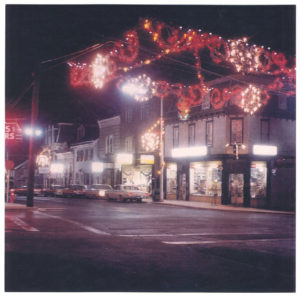
Thurmont’s current mayor, John Kinnaird, actively communicates and updates friends on his Facebook page. Upon learning of Donald’s death, he posted the photo of Lewis’ Store on the square in Thurmont (pictured above) and said, “Donald was a true gentleman and always had the best interest of our community at heart.” Kinnaird also invited comments from friends.
Janet Lewis posted, “He was a director at Thurmont Bank, always wanted to give the tellers a raise, he always tried anyway.”
George Wilhide posted, “I loved the soda fountain. He had a barrel of root beer behind the counter. We got a frosty mug of that root beer for a nickel. It was so cold it hurt your teeth, but was soooo good!!!”
Art Drager posted, “Very sad news! He was a wonderful man with always a smile on his face and something nice or funny to say! One of my favorite stories was when he took Dr. Pargman, Director of Camp Airy from 1924-1969 and Merle Eyler fishing…Doc said he wasn’t catching any fish. Finally, Donald told Doc he wasn’t going to catch any fish with the hook caught in his pants! The 10 cent root beer in frozen mugs was the best a wonderful treat on a hot summer day! Mr. Lewis was dedicated to Thurmont, its residents, The Brotherhood of the Jungle Cock organization, and was a good friend to Camp Airy! My first tennis racket was purchased at his store.”
Other sentiments include those from Donald’s long-time friend, Larry Eby. He said, “In the sixty years I’ve known Donald Lewis, a lot comes to mind and I could write a book. However, for the purpose here, I’ll share single words that define a complex individual. Friend, mentor, peace maker, warrior, manager, father figure, generous, accountable, forgiving, held high standards, stubborn. Lastly, Godfather which earned him the name, Don-Don and his wife, Fi-Fi.” Larry’s wife, Donna, who worked at Lewis’ store, added a few adjectives, “Strict, trusting, and kind.”
Donald’s niece, Sue Ferguson, was his main support in his final years. She was often on hand at Homewood where Donald lived for several years. She made sure he was happy, loved, and well cared for.
Sue shared, “Donald and Freda traveled to every state in the union in their RV, including going through Alaska and to the North Pole. They flew to Hawaii. Went from coast to coast two times to see the Rose Bowl parade.
He felt it a privilege to serve his country. He never wanted to talk about the war for a long time. He felt honored to serve Frederick County as a Count Commissioner and took that position very seriously. He always gave an honest answer, never “honey coated.”
It was a privilege and honor for him to serve as mayor of his home town. He loved living in Thurmont. After retiring, he spent his winters in Florida, always ready to go soon after hunting season. But, in the spring, he would say he was ready to be back home.
After selling his property on the west end of Thurmont, he was told he could move into a cottage at Homewood in Frederick, where he had his name on the list for quite a few years. Just before he was to go, he came to my house one Saturday morning, and said, ‘I have to talk to you. I can’t move to Homewood, I want to stay here in Thurmont, this is my home.’ I told him about a condo for sale on Easy Street, he looked through it, and said he’d buy it. He was so happy there and loved staying in town with the people and place that was so very special to him.”
Our community thanks you, Sue, for taking such good care of your Uncle Donald, the community’s friend.

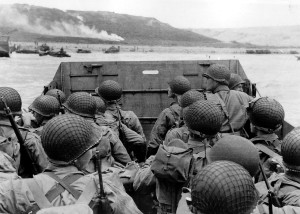 Donald Lewis stood crammed among a group of friends and fellow soldiers, trying not to lose his balance. The landing craft they were on was pushing toward its destination on Omaha Beach at Normandy, France. A strong current threatened to pull them away from their destination.
Donald Lewis stood crammed among a group of friends and fellow soldiers, trying not to lose his balance. The landing craft they were on was pushing toward its destination on Omaha Beach at Normandy, France. A strong current threatened to pull them away from their destination.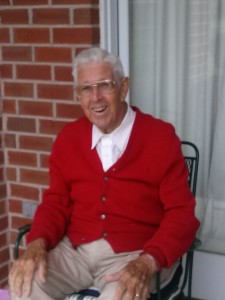 Lewis also had a political career. He served two terms as Mayor of Thurmont and one term as a Frederick County Commissioner. He said a group of people tried to talk him into running for governor, but he turned them down, saying, “I’m too honest for that.”
Lewis also had a political career. He served two terms as Mayor of Thurmont and one term as a Frederick County Commissioner. He said a group of people tried to talk him into running for governor, but he turned them down, saying, “I’m too honest for that.”